- Home
- Cecelia Ahern
Flawed Page 2
Flawed Read online
Page 2
Bob shouts at them from the ground. “Let her have some dignity, goddammit.”
She’s taken inside the van. The door slides shut. The whistles stop.
I’ve never heard a man cry like Bob. The Whistleblowers holding him down speak to him in low, calm voices. He stops yelling, but his crying continues. They finally let him go and disappear into the second van. They drive away.
My heart is pounding, and I can barely breathe. I cannot believe what I’m seeing.
I wait for the outpouring of love from my neighbors. We are a tight, close-knit community; we have many community days; we support one another. I look around and wait. People watch Bob sit up in the grass, pulling his children close and crying. Nobody moves. I want to ask why no one is doing anything, but it seems stupid, because I’m not, either. I can’t bring myself to. Even though being Flawed isn’t a crime, aiding or assisting a Flawed carries the punishment of imprisonment. Bob isn’t Flawed—his wife is accused—but still, everyone is afraid to get involved. Our neighbors Mr. and Mrs. Miller turn around and head back into their house, and most of the others follow suit. My mouth falls open, shocked.
“Damn you!” Bob shouts across the road. It is quiet at first, and I think he’s saying it to himself, and then I think as he says it louder he’s saying it to the vans that have disappeared, but as he gets even louder and the anger increases, I see he’s directing it at us. What did we do?
“Stay here,” Dad says to us, then he gives Mom a long look. “Everybody, back inside. Keep it calm, yes?”
Mom nods, and her face is serene as if nothing has happened; the mask is back on, the loose strands of hair already back in place, though I don’t recall her fixing them.
As I turn around to look back into my house, I see Bosco standing inside at the window, arms crossed, watching the scene unfold. And I realize it’s him that Bob is shouting at. Bosco, the head of the Guild, is the head of the organization that took Angelina away.
He can help; I know it. He’s the head of the Flawed court. He will be able to help. It will be all okay. Normality can resume. The world will be turned the right way around again. Things will make sense. Knowing this, my breathing starts to return to normal again.
As Dad nears Bob, the shouting dies down, but the crying continues, a heartbreaking sound.
When you see something, it can’t be unseen. When you hear a sound, it can never be unheard. I know, deep down, that this evening I have learned something that can never be unlearned. And the part of my world that is altered will never be the same.
FIVE
“LET’S ADDRESS THE elephant in the room,” Bosco says suddenly, reaching for the red wine and filling his glass generously. He had insisted we all sit back down at the table, though there isn’t anyone who feels hungry after what we’ve just witnessed. Dad is still with Bob. Mom is in the kitchen preparing the main course.
“I don’t understand,” I say to Bosco. “Angelina Tinder is accused of being Flawed?”
“Mm-hmm,” he says good-naturedly, his blue eyes dancing as he looks at me. It’s almost as if he is enjoying my reaction.
“But Angelina is—”
Mom drops a plate in the kitchen, and it smashes and it stops me in my tracks. Was that a warning from her? To tell me to stop talking?
“I’m okay!” she calls, too chirpily.
“What were you going to say about Angelina, Celestine?” Bosco eyes me carefully.
I swallow. I was going to say that she is nice, that she is kind, that she has young children and she’s a great mom and that they need her, that she has never said or done anything wrong in all the moments I’ve spent time with her. That she’s the most talented piano player I’ve ever heard, that I hoped I could play just like her when I’m older. But I don’t because of the way Bosco is looking at me and because Mom never usually breaks anything. Instead I say, “But she teaches me piano.”
Juniper tuts beside me in disgust. I can’t even look at Art, I’m so disappointed in myself.
Bosco laughs. “We can find you a new teacher, dear Celestine. Though you raise a good point. Perhaps we should think about stopping her from playing piano. Instruments are a luxury the Flawed don’t deserve.” He tucks into his starter and takes a huge bite of carpaccio, the only person at the table even holding his cutlery. “Come to think of it, I hope that’s all she was teaching you,” Bosco says, his smiling eyes gone.
“Yes, of course,” I say, frowning, confused that he would even question that of me. “What did she do wrong?”
“Taught you the piano,” Art teases. “Her downfall, if anyone’s heard you.”
Ewan giggles. I smile at Art, thankful for the break in nervous tension in the room.
“It’s not funny,” Juniper says beside me, quietly but firmly.
Bosco’s eyes move to her immediately. “You’re correct, Juniper. It’s not funny.”
Juniper averts her eyes.
And the tension is back.
“No, it’s not funny, comical, but it’s funny, peculiar,” I say, feeling slapped.
“Thank you, Thesaurus,” Juniper says under her breath. It’s what she and Ewan always call me when I get bogged down by definitions.
Bosco ignores me and continues to direct his gaze at my sister. “Did Angelina teach you, too, Juniper?”
Juniper looks him square in the eye. “Yes, she did. Best teacher I ever had.”
There’s a silence.
Mom enters the room. Perfect timing. “I must say, I was very fond of Angelina. I considered her a friend. I’m … shocked by this … event.”
“I did, too, Summer, and believe me no one feels more pain than I do in this moment, seeing as I am the one who will have to tell her the verdict.”
“You won’t just tell her, though, will you?” Juniper says quietly. “It will be your verdict. Your decision.”
I’m afraid of Juniper’s tone. This is not the correct moment for one of her soapbox airings. I don’t want her to annoy Bosco. He’s someone who should be treated with respect. Juniper’s language feels dangerous. I’ve never seen anyone speak to Bosco in this way.
“You just never know what those among us, whom we consider friends, are really like,” Bosco says, eyes on Juniper. “What lurks beneath those you consider your equals. I see it every day.”
“What did Angelina do?” I ask again.
“As you may well know, Angelina traveled outside this country with her mother a few months ago to perform euthanasia, which is illegal here.”
“But she accompanied her mother on her mother’s wishes, to another country where it was legal,” Juniper says. “She didn’t do anything illegal.”
“Nor is the Guild a legal courtroom, merely an inquisition into her character, and we feel that in her doing so, making the decision to travel to another country to carry out the act, she is deemed to have a Flawed character. Had the government known her plans to carry this out, it would have had a case to stop her.”
There’s silence at the table while we take this in. I knew that Angelina’s mother had been terribly sick for years; she had been suffering with a debilitating disease. I had not known how she had met the end of her days, but we had all been at the funeral.
“The Guild doesn’t take any religious views into account, of course,” he continues, perhaps sensing our doubts on his judgment. “We merely assess the character of a person. The Guild must observe the accepted teaching about the sanctity of life. In allowing Angelina Tinder to return to this country having done what she did and continuing on as she had, the Guild would be ignoring the teachings and instead would be sanctioning anguish and pain. Whether it was in a different country and whether it was legal are beside the point. It is her character that we must look at.”
Juniper just snorts in response.
What is it with her? I hate this about my sister. In everybody else’s opinion, we are identical. Though she is eleven months older than I am, we really could pass for twins. However, if y
ou knew us, we would never get away with it, because Juniper gives herself away as soon as she opens her mouth. Like my granddad, she doesn’t know when to shut up.
“Did you know that Angelina Tinder was planning on traveling to kill her mother?” Bosco asks, leaning forward, elbows on the table, focusing on Juniper.
“Of course she didn’t know,” Mom says, her voice coming out as a whisper, and I know that by her doing this, she wanted to shout.
Juniper stares down at her untouched starter, and I silently beg her to keep quiet. This isn’t fun. A room full of people I love, and my heart is pounding as if something dangerous is happening.
“Will Angelina be branded?” I ask, still in shock that I could actually know a Flawed person, have one live right on this street.
“If found guilty on Naming Day, yes, she will be branded,” Bosco says, then to Mom, “I’ll do everything to keep it out of the press for Bob’s sake, of course, which won’t be difficult, as the Jimmy Child case is taking over all the airwaves. Nobody cares about a Flawed piano teacher right now.”
Jimmy Child is a soccer hero who was caught cheating on his wife with her sister for the past ten years and faces a Flawed verdict, which would be disastrous, as it would mean he couldn’t travel overseas for matches. Among many of the punishments the Flawed face, they must give up their passports.
“I’m sure Bob will appreciate your discretion,” Mom says, and it sounds so smooth and easy to her that I know she really feels awkward and it’s stilted in her mind.
“I hope so,” Bosco says, nodding. “I certainly hope so.”
“Where will she be branded?” I ask, obsessed with this. I just can’t seem to wrap my head around it and can’t understand why nobody else is asking questions. Apart from Juniper, of course, but hers are more accusing than anything else.
“Celestine,” Mom says harshly, “I don’t think we need to discuss—”
“Her right hand,” Bosco says.
“Theft from society,” I say.
“Indeed. And every hand she goes to shake from now on will know just what she is.”
“If she’s found Flawed. Innocent until proved guilty,” Juniper says, like she’s reminding him.
But we all know Angelina Tinder has no chance. Everyone who goes through the Flawed court is found guilty; otherwise, they wouldn’t be taken in the first place. Unlike Juniper, I understand rules. There is a line, a moral one, and Angelina crossed it, but I just can’t believe that I could know someone who is Flawed, that I could sit in her house beside her at her piano, a piano she touched, then I touched with my fingers. I want to wash my hands immediately. I try to think back on our last conversation, on previous conversations, to see if she showed any hint of a dent in her character. I wonder about her daughter, Colleen. Can I still talk to her at school? Probably best not to. But that doesn’t feel right, either. I’m conflicted.
“Where is Cutter?” Bosco suddenly says, looking at Mom angrily.
“He’s with Bob. I’m sure he’ll be back soon,” she says politely.
“That doesn’t look good,” he says. “He should be here.”
“I’m sure he’ll be—”
“I hope she can still play piano,” Juniper interrupts Mom, out of nowhere. “With her hand seared.”
“Do you feel sorry for her?” Bosco asks, his irritation rising.
“Of course she doesn’t,” Art pipes up, mouth full of food, knife and fork squeezed between his huge man hands and pointing up at the ceiling like he’s a caveman. He waves them around as he talks, food spraying off and flying onto the table. “We’re all just shocked, Dad, that’s all. I mean, come on, you could have given us a heads-up, that our expected dinner guests were about to be taken away? When that siren went off, poor Celestine looked like she thought she was about to get carted away to the madhouse, which between me and you is where she belongs, but she doesn’t need to know that.”
He says it so easily, so fresh, so, well, judged that it seems to remind Bosco of where he is: in his neighbor’s dining room with his son, and not in his courtroom.
“Of course.” Bosco looks confused for a moment, and then he looks at Ewan, who has been remarkably quiet at the table. He reaches out a hand and pats my hand warmly. “Sorry, dear Celestine, I didn’t mean to scare you. Let’s start again, shall we?” He picks up his glass of red wine and holds it in the air with a beaming smile. “Happy Earth Day.”
SIX
WHEN I HEAR that the quiet murmuring, which was decidedly longer tonight than usual after the evening’s events, has ended in my parents’ bedroom, and the house has settled for the night, I make my way to the summit, where Art and I have been meeting most nights for the past three months.
I have spent more time with the Crevans over the past few months than with my own family, often wishing I could stay with them for good. I feel like I fit in with them more, that everything with them is logical and makes sense. I have always believed in the workings of the Guild. I am one of Bosco’s greatest supporters. I like to hear him regale people with stories of the courthouse over dinner, how he Ousted a charity board member for taking a golden payment pension package, or branded a celebrity who’d made millions on the sale of her fitness DVD but was discovered as having a secret tummy tuck. Every day, he has interesting stories coming through his courtroom, and I love sitting down and hearing about them. I understand what he is doing. He is preventing people from being deceived. I know the difference between right and wrong. I understand the rules. But today I feel that the rules, of which I am a true supporter, have been blurred, because today they were literally on my front doorstep.
It is 11:00 PM. The summit overlooks the sleeping capital city. We live in a valley surrounded by mountains. Atop one of those mountains, Highland Castle dominates the city. Lit up by powerful red uplighters at night, it watches over us menacingly. In existence since AD 1100 and once the seat of the HighKings, Highland Castle is a fortress. It stands above us all, the tallest round tower in the world, its powerful eye seeing far and wide. The scene of centuries of invasions and massacres, it now houses state conferences and dinners, guided tours of its architecture, museums of its ancient artifacts, and, of course more famously now, the offices of the Guild. We sit on the summit opposite the castle; to the left of us, the lights of more cities dot the night and stretch on forever, the castle keeping its watchful eye on them all. To the right are farmland and industry, where my granddad lives. Humming is the largest and capital city of Highland, and it is rich in history and beauty. Tourists flock from all over the world to visit our city, our bridges, our fairy-tale castle and palace, our cobblestoned pathways, and our ornate town square. Most of its buildings have survived the violence and destruction of the twentieth century, and it is a hub for appreciators of our Romanesque, Gothic, and Renaissance architecture. Humming Bridge is one of the most famous bridges in the world. At thirty feet wide and over six hundred yards long and built in the fourteenth century, it crosses the river and leads to Highland Castle. It, too, is a beauty at night, lit up at its six arches, three bridge towers, and the statues from our history lining the bridge to protect it.
I like to travel the world on vacations, but I intend on continuing to live here after school. Art and I have talked about it. We want to go to the city university, me studying mathematics, him studying science. We have it all worked out. Juniper wants to leave as soon as she can, become a snowboard instructor in Switzerland by winter, a lifeguard in Portugal by summer, or something like that.
Art says he likes going to the summit because it gives him perspective. He’s had a tough year. His mother passed away, and I think this place helps him rise above the worries on the ground, to look at it from a height as if he is distanced from the problems, detached from his grief, which is lessening with the months. I, on the other hand, see it as a place where it is Art and me against the rest of the world. While the one million people sleep in the city below us, Art and I are together, and it makes ou
r bond feel even stronger. It makes me feel invincible, alive. I know how the castle feels watching over everybody: untouchable.
It is only over the past six months that I have felt this way about Art. We have been friends since we were twelve, when we started school together. The teacher placed us beside each other on the first day. We hung out together with a group, me with the girls and he with the boys, yet we always found ourselves side by side. We would never have met up alone despite living across the road from each other. It was only a year ago, when his mom passed away, that Art suddenly began to seek me out, not caring about the perception of us to the others. We’d come here together and talk, him grieving and slowly coming to terms with his mom’s death; he watched her slowly die of cancer. And then the grieving gradually flickered out, didn’t become the main reason for our meeting, and it became something else.
That was when the something happened for me. The rush of butterflies when I saw him, the silly smile that would appear on my face at the very thought of him, the nervous bubbles in my stomach, the jolt of electricity when his skin brushed mine. Suddenly I cared about what I wore, what I said, how I looked. This didn’t go unnoticed, particularly by Juniper, who watched me each day as I obsessed over my reflection before I dashed out of the house. Art noticed, too, and then I stopped flustering over myself for a moment to notice it in him. We’ve been together for three months.
I finally reach the summit and seeing his shape lit by the moon turns me into jelly as usual. He is always early, always waiting for me, sitting on a blanket, his face a picture of perfect concentration as he gazes out on the sleeping city below. Perfect is a word I use a lot to describe Art or any moment with him.
“Hello, early bird,” I say.
He looks up, the sadness replaced with a smile. And do I see relief?

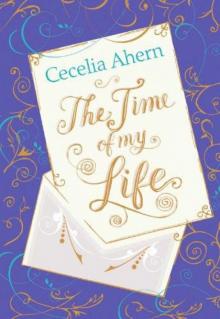 The Time of My Life
The Time of My Life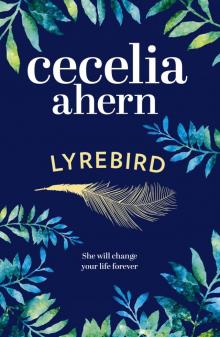 Lyrebird
Lyrebird Girl in the Mirror
Girl in the Mirror Perfect
Perfect One Hundred Names
One Hundred Names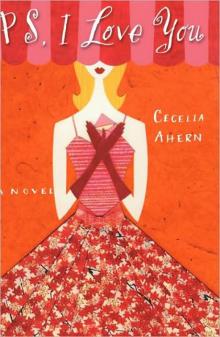 PS, I Love You
PS, I Love You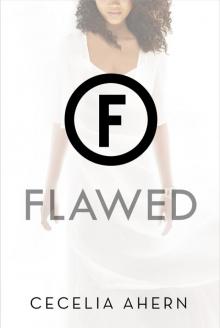 Flawed
Flawed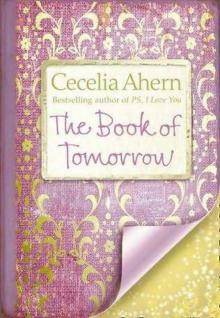 The Book of Tomorrow
The Book of Tomorrow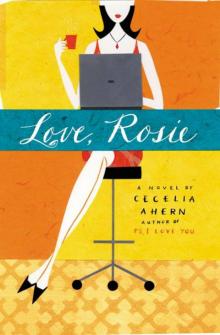 Love, Rosie
Love, Rosie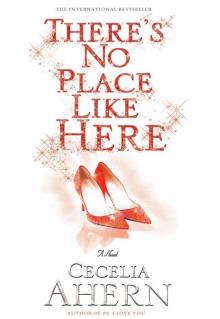 A Place Called Here
A Place Called Here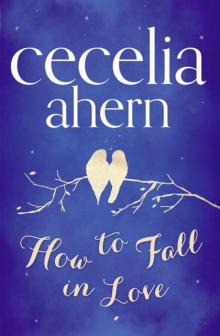 How to Fall in Love
How to Fall in Love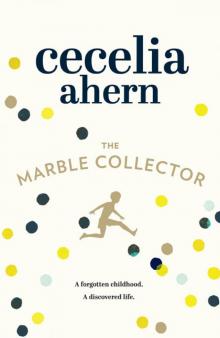 The Marble Collector
The Marble Collector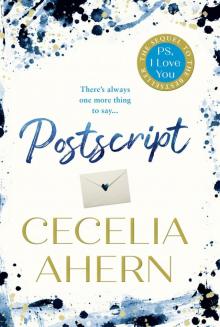 Postscript
Postscript The Gift
The Gift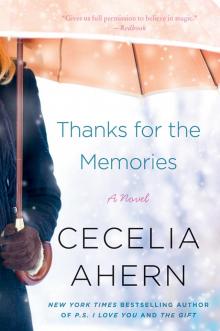 Thanks for the Memories
Thanks for the Memories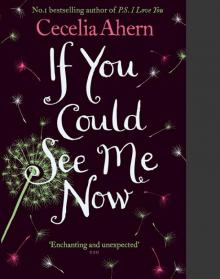 If You Could See Me Now
If You Could See Me Now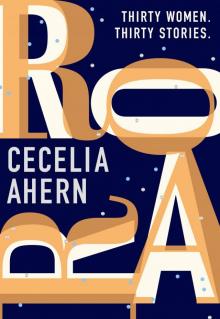 Roar
Roar Cecelia Ahern 2-book Bundle
Cecelia Ahern 2-book Bundle Girl in the Mirror: Two Stories
Girl in the Mirror: Two Stories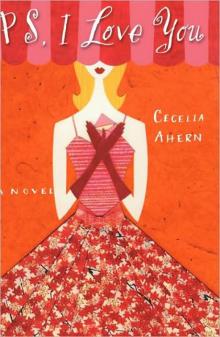 PS, I Love You: A Novel
PS, I Love You: A Novel Cecelia Ahern Short Stories
Cecelia Ahern Short Stories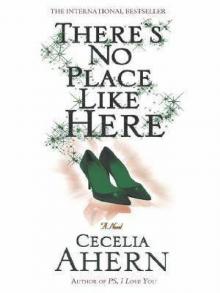 There’s No Place Like Here
There’s No Place Like Here